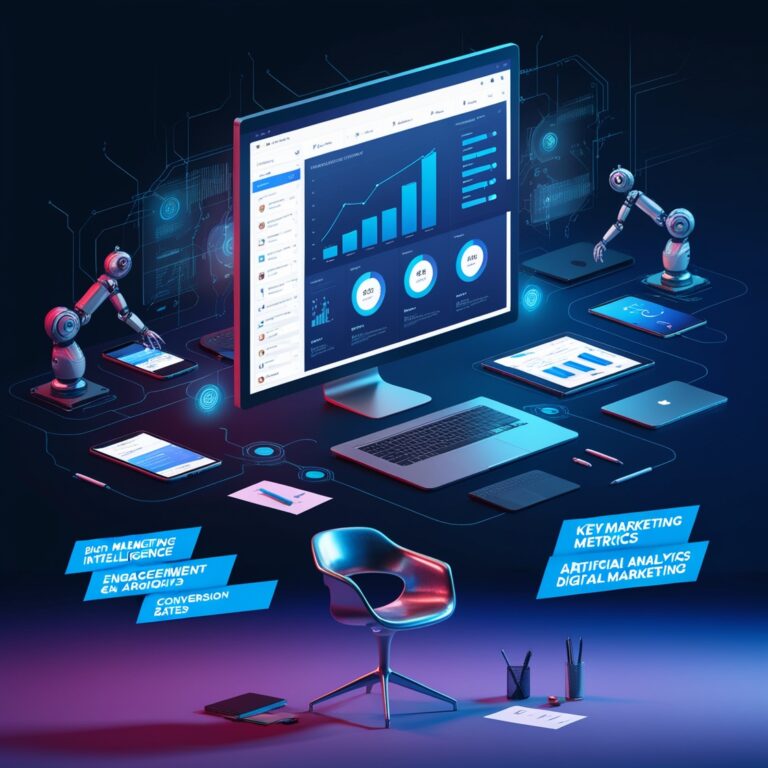
Come along with us as we explore the powerful impact of artificial intelligence (AI) on digital marketing and arm you with the skills needed to succeed in this thrilling era of technological advancement. This book is designed to be your ultimate resource for understanding and harnessing the power of AI in digital marketing, whether you’re a marketer, business owner, or simply fascinated by the future of marketing
For companies looking to stay competitive in the rapidly changing world of digital marketing, being ahead of the curve is crucial. Using artificial intelligence (AI) has become a game-changer for marketers all around the world as customer behaviors change, technologies develop, and data becomes more plentiful. AI is transforming everything from predictive analytics and automated customer support to tailored content recommendations.
This thorough study explores the many uses, advantages, and difficulties of artificial intelligence as it relates to digital marketing. This guide promises to offer insightful analysis and practical advice to help you successfully navigate the AI-powered landscape, regardless of your level of experience or desire to improve your tactics.
We’ll solve the puzzles of AI algorithms, talk about practical applications of AI in a variety of marketing channels, and look at the moral issues related to its application throughout this book. Additionally, we’ll explore how AI will change the marketing sector in the future and talk about how companies can adjust to take advantage of all.
Understanding Artificial Intelligence in Digital Marketing

Fundamentally, artificial intelligence (AI) is the process by which technology, especially computer systems, mimic human intelligence. Artificial Intelligence (AI) in digital marketing refers to a variety of tools and methods that let computers examine information, recognize trends, and make judgments with little assistance from humans. Among these are deep learning, machine learning, natural language processing, and predictive analytics.
Because they allow computers to learn from data inputs and make predictions or conclusions based on patterns found in the data, machine learning algorithms—a type of artificial intelligence—are essential to digital marketing. This capacity to instantly extract insights from enormous volumes of data has completely transformed how marketers comprehend and interact with their target consumers.
Ways AI Helps in Digital Marketing
AI has a wide range of uses in digital marketing, enabling marketers to improve client experiences, maximize advertising, and spur company expansion. Among the main uses of AI in digital marketing are:
Personalization: By examining each customer’s choices, actions, and interactions with the company, AI helps marketers to provide them with incredibly tailored experiences. Marketers may better segment audiences, suggest pertinent goods or services, and craft message that speaks to each individual client by using sophisticated algorithms.
Predictive analytics: Based on patterns in historical data, marketers can forecast future trends, behaviors, and results by utilizing machine learning algorithms. This helps them predict consumer demands, improve marketing efforts for increased effectiveness, and make data-driven choices to be ahead of the competition.
Creation and Curation of Content:
AI-powered solutions are able to produce content at scale, including blog entries, product descriptions, social media postings, and automated email responses. Furthermore, marketers may save a great deal of time and money by using AI algorithms to curate content from several sources according to quality, relevancy, and engagement metrics.
Customer service and support:
AI-powered chatbots and virtual assistants may offer consumers immediate, individualized help via a variety of platforms, including as messaging applications, social media, and websites. By handling basic questions, resolving common problems, and, when needed, elevating challenging requests to human agents, these AI-driven bots can improve the entire customer experience.
Automation of Marketing:
Marketers can concentrate on high-value activities that call for creativity and strategic thinking by using AI-powered marketing automation solutions to automate repetitive processes like email marketing, lead nurturing, and campaign management. Businesses may increase productivity, lower manual error rates, and more successfully grow their marketing campaigns by automating workflows and procedures.
Dynamic Pricing:
AI systems are able to dynamically modify prices in real-time by analysing a variety of variables, including demand, rival pricing, and consumer behaviour. This makes it possible for marketers to give discounts or promotions to particular client segments or at times of high demand in order to maximize income from pricing tactics. Businesses can maintain their competitiveness and increase income while offering customers value by implementing dynamic pricing.
Email Marketing Optimization:
AI-driven email marketing systems are able to examine engagement metrics, subscriber information, and past campaign results to improve email segmentation, timing, and content. Marketers may create individualized and targeted email messages that connect with recipients by utilizing machine learning and predictive analytics. This will increase open rates, click-through rates, and conversions.
Search Engine Optimization (SEO):
AI-powered SEO solutions are able to evaluate rival strategies, keyword trends, and website performance to offer useful information for raising organic search rankings. These tools assist marketers in finding ways to raise organic traffic from search engines like Google, improve content relevancy, and increase website visibility. In order to enhance overall search performance, AI-powered SEO solutions also provide suggestions for on-page optimization, link development, and content strategy.
Social Media Marketing: AI systems are able to examine sentiment, engagement data, and social media conversations to offer suggestions for improving social media marketing tactics.
Social media management systems driven by AI can be used by marketers to plan posts, track brand mentions, and find popular hashtags or themes. Marketers may better understand audience preferences, monitor competitive activity, and interact with followers on many social media platforms with the use of AI-driven social listening.
Lead Qualification and Scoring
In order to rank and qualify leads according to their propensity to convert, AI-powered lead scoring models can examine prospect data, engagement signals, and behavior patterns. Marketers may concentrate their efforts on high-potential prospects by automating lead scoring procedures. They can then nurture these prospects with tailored messaging and targeted campaigns to increase conversions and sales.
Virtual reality (VR) and augmented reality (AR):
The creation of engaging AR and VR experiences for marketing is made possible by AI technologies like computer vision and natural language processing. AI-powered AR and VR apps may be used by marketers to produce gamified brand experiences, virtual try-ons, and interactive product demos that enthrall and engage consumers while increasing brand recognition and loyalty.
Fraud Detection and Prevention:
Artificial intelligence (AI) systems are able to recognize possible fraudulent activities and stop fraudulent transactions in real time by identifying patterns and anomalies in transaction data. AI-powered fraud detection tools can be used by marketers to preserve consumer information, prevent payment fraud, and uphold credibility and trust with their target audience. AI-powered fraud detection reduces the monetary losses and harm to a company’s reputation that come with fraudulent activity.
Marketers may obtain important insights, automate tedious operations, and provide individualized experiences that increase engagement, loyalty, and income by utilizing AI in four different facets of digital marketing. AI’s influence on the direction of digital marketing will only grow as it develops and advances, giving marketers fresh chances to be creative and succeed in a field that is becoming more and more competitive.
how to use AI in Digital Marketing: A Guide

Specify your objectives:
Start by outlining your marketing goals precisely. Are you trying to raise sales, create leads, improve website traffic, or raise brand awareness? Knowing your objectives will help you choose the AI techniques and tools that will work best for you.
Examine your infrastructure:
Examine your website, email marketing platform, CRM (Customer Relationship Management) system, social media accounts, and any other pertinent tools or platforms that are part of your current digital marketing architecture. Make sure AI solutions can be effortlessly integrated into your infrastructure.
Capabilities of audit staff:
Assess your marketing team’s skill sets to find out how well-versed they are in AI technologies. Determine whether there are any skills shortages that require hiring or training. It is crucial that your group is prepared to use AI tools effectively.
choose the appropriate AI marketing resources:
Harness the power of AI by selecting marketing platforms and technologies that align seamlessly with your infrastructure and goals. Leverage AI-driven chatbots to enhance customer service, advanced analytics tools for data-driven insights, predictive analytics for precise lead scoring, and personalization engines for tailored content experiences. Choose solutions that integrate effortlessly with your existing systems and are designed to meet your specific needs, maximizing the transformative potential of AI in your marketing strategy.
Examine and evaluate AI:
After choosing AI tools, make sure they work as planned and produce the intended outcomes by thoroughly testing them. Track key performance indicators (KPIs) that are pertinent to your marketing objectives and examine how AI affects them. Continue to improve your tactics in light of new information from AI-driven analytics.
Create an innovative culture:
Encourage experimentation and embrace new technology to cultivate an innovative culture within your marketing team. Give people the chance to learn about AI and other cutting-edge technology and advance their careers. To make it easier to share ideas and thoughts, promote teamwork and candid communication.
Obstacles and Things to Think About

While there are many benefits for marketers with AI, there are also some issues and concerns that need to be taken into account to guarantee ethical use and successful deployment. Among the major obstacles are:
Security and Privacy of Data:
Maintaining the security and privacy of consumer data is crucial as AI mostly depends on data inputs to produce insights and predictions. To secure sensitive data from misuse or unauthorized access, marketers must put strong security measures in place and abide by data protection laws like the CCPA and GDPR.
Fairness and Bias:
Based on the data they are trained on, AI algorithms may display prejudice or discrimination, producing unfair or discriminating results, especially when it comes to targeting and decision-making. By carefully choosing and preparing training data and routinely checking algorithmic outputs for correctness and fairness, marketers can try to reduce bias
Accountability and Transparency:
Because AI algorithms are frequently opaque and hard to grasp, it can be hard for marketers to know how and why decisions are being made. Building trust with stakeholders and customers while ensuring the ethical and responsible use of AI technologies requires establishing openness and accountability in AI-driven operations.
Gap in Skills and Talent:
Many marketing teams may lack the particular knowledge and abilities in data science, machine learning, and programming needed to implement AI in digital marketing. To close the skills gap and fully utilize AI, businesses must either hire outside talent or spend in training and upskilling existing employees.
AI in Digital Marketing Examples

Netflix:
Personalized suggestions: Netflix provides individualized suggestions by analysing user data, including viewing history, ratings, and interactions, using AI algorithms. These algorithms make recommendations for material based on user preferences by using machine learning techniques.
Netflix uses artificial intelligence (AI) to optimize content delivery by encoding videos in various resolutions and codecs according to the user’s device and internet connection. This guarantees that consumers will have a flawless streaming experience on a variety of devices and network situations.
Content Development:
AI is also used by Netflix in the production and creation of its content. When deciding whether original material to create or license, for instance, it employs machine learning algorithms to examine audience preferences and spot trends.
Spotify:
Customized Playlists:
Spotify uses artificial intelligence (AI) to create customized playlists, like Discover Weekly and Daily Mixes. These playlists are created using algorithms that continuously learn from and adjust to user feedback, taking into account the listening history, preferences, and behavior of the user.
Music Suggestions:
Spotify’s recommendation system, like Netflix’s, makes AI-based suggestions for songs, albums, and artists based on user preferences. This assists consumers in finding new music that suits their tastes.
Spotify uses AI-powered audio analysis methods to classify music according to acoustic characteristics like genre, tempo, and mood. More accurate playlists and better song suggestions are made possible by this metadata.
Amazon:
Product Suggestions:
To make pertinent product recommendations, Amazon’s recommendation engine analyzes user activity, past purchases, and browsing habits using AI algorithms. These suggestions appear in targeted ads, customized emails, and on the Amazon website.
AI is used by Amazon for supply chain efficiency, demand forecasting, and inventory management. Machine learning algorithms forecast demand for different products and adjust inventory levels based on past sales data, market trends, and outside variables.
Voice Assistants:
Alexa, Amazon’s use power of ai to uses machine learning algorithms and natural language processing (NLP) to comprehend customer inquiries, deliver pertinent information, and carry out operations like placing orders and managing smart home appliances.
Prospects & Trends for the Future
Looking ahead, there is a lot of potential for more innovation and change in the use of AI in digital marketing. The ability of marketers to provide individualized, immersive, and engaging experiences across all digital touchpoints will be further enhanced by developments in AI technologies, such as computer vision, reinforcement learning, and natural language understanding.
Furthermore, AI will become more economical and available to companies of all sizes as a result of its democratization through cloud-based platforms and APIs, democratizing access to sophisticated analytics and automation capabilities. Because of this democratization, marketers will be able to test out AI-driven tactics and solutions without having to make large upfront investments in technical know-how or infrastructure.
Concluding remarks
As this thorough guide comes to an end, it is clear that artificial intelligence (AI) has emerged as a vital element in the toolbox of contemporary digital marketers. AI offers a multitude of options to spur growth and innovation in the field of digital marketing, from improving customer engagement and personalization to optimizing advertising campaigns and expediting workflow procedures.
But enormous power also comes with immense responsibility. Businesses must approach AI implementation with careful consideration of ethical implications and privacy concerns as it continues to permeate every part of marketing. To gain customers’ trust and create enduring relationships, AI-driven marketing tactics must continue to prioritize transparency, responsibility, and the ethical use of data.
Looking ahead, artificial intelligence in digital marketing has a bright future. Predictive analytics, machine learning, and natural language processing developments will significantly enhance marketers’ capacity to provide highly customized experiences and foresee client wants with previously unheard-of precision. Furthermore, AI will enable companies of all sizes to compete on an even playing field and spur industry innovation as it becomes more widely available and reasonably priced.
In summary, the combination of artificial intelligence (AI) with digital marketing is a game-changing force that has the potential to change how companies interact with their customers in the digital era. Marketers may open up new opportunities for expansion, productivity, and innovation by judiciously utilizing AI technologies, which will help their brands soar in a more cutthroat industry. As we set out on this path of digital transformation, let’s not waver in our dedication to moral behaviour and customer-focused thinking, making sure AI is a positive influence on how marketing develops in the future.
